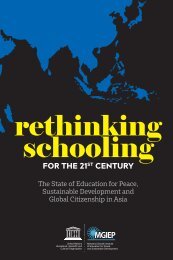UNESCO MGIEP's Annual Report 2020
2020 was indeed a very tough year for all of us. People across the globe were forced into the new normal: lockdowns, shutdowns, and travel bans. Families were separated. Millions fell sick and so many lives were lost. More than 1 billion children were affected by school closures. At UNESCO MGIEP, we analysed the impact of COVID-19 on our programs and pivoted our strategy to ensure that we continued to engage with educators, policymakers and the youth through various online initiatives to build a better, sustainable world for times to come.
2020 was indeed a very tough year for all of us. People across the globe were forced into the new normal: lockdowns, shutdowns, and travel bans. Families were separated. Millions fell sick and so many lives were lost. More than 1 billion children were affected by school closures. At UNESCO MGIEP, we analysed the impact of COVID-19 on our programs and pivoted our strategy to ensure that we continued to engage with educators, policymakers and the youth through various online initiatives to build a better, sustainable world for times to come.
Create successful ePaper yourself
Turn your PDF publications into a flip-book with our unique Google optimized e-Paper software.
<strong>UNESCO</strong> MGIEP <strong>Annual</strong> <strong>Report</strong> | <strong>2020</strong><br />
APPROACH<br />
Cognitive neuroscience research has shown that<br />
a significant part of our learning occurs due to a<br />
neurobiological process called ‘neuroplasticity’,<br />
which is the capacity of the brain to rewire in<br />
response to the environment. Scientific research<br />
also establishes that since no two brains are<br />
identical, learning needs to ‘individualised’ as<br />
much as possible.<br />
It is in light of these findings that <strong>UNESCO</strong> MGIEP<br />
has designed its approach for learners. The Institute<br />
works on the premise that education needs to<br />
include the learning of skills through which<br />
individuals recognize and regulate emotions,<br />
identify a positive purpose, demonstrate empathy<br />
for others, and take constructive action to promote<br />
human flourishing.<br />
KEY INITIATIVES<br />
MGIEP’s courses embed social and emotional<br />
learning and are designed to build brain circuits<br />
that will drive behavioural change needed<br />
to shape more peaceful, just and sustainable<br />
societies. They embed the EMC 2 (Empathy,<br />
Mindfulness, Compassion and Critical Inquiry)<br />
framework and are delivered using interactive<br />
digital pedagogies on the Institute’s indigenously<br />
developed General Data Protection Regulation<br />
(GDPR) learning platform, FramerSpace.<br />
SEL for the early years<br />
(GC Primer)<br />
SEL for the early years (GC Primer) – The GC Primer<br />
programme is designed to train and equip teachers<br />
to create and use SEL activities in the classroom<br />
for children in age group of 6-12 years (K-6). Using<br />
a combination of storytelling, reflection, play<br />
activities, circle time and experiential activities,<br />
the teacher’s toolkit uses social and emotional<br />
learning to build global citizenship in children<br />
specifically social and emotional competencies of<br />
empathy, mindfulness, compassion and critical<br />
inquiry.<br />
Details of the course are available here<br />
SEL for adolescents<br />
(GC Builder)<br />
The programme uses a theme-based approach<br />
that embeds social and emotional learning<br />
to build both intellectual and emotional<br />
intelligence in adolescents in the age group of<br />
12-14 years. All courses use the Libre approach<br />
for digital pedagogies and integrate storytelling,<br />
gamification, inquiry, reflection and dialogue, to<br />
create a rich digital multisensory, interactive, and<br />
an engaging online learning experience.<br />
Pandemics Course<br />
In order to enable an understanding of the<br />
COVID-19 pandemic and to help students discern<br />
fact from myth as well as build resilience, an online<br />
interactive course on Pandemics was developed<br />
which reached nearly 450 children from various<br />
countries.<br />
Details of the course are available here<br />
Global Citizenship Course<br />
To build Global Citizenship skills in adolescents,<br />
MGIEP designed a unique course with modules on<br />
migration, climate change, nationalism, identity,<br />
violence, governance, citizenship rights and duties<br />
and identity. This online self-directed course for<br />
adolescents introduces them to not only learn<br />
about the issues described above but also build<br />
in them empathy, mindfulness, compassion and<br />
critical inquiry skills to manage these themes and<br />
take action as global citizen.<br />
A second aspect that is emphasized is the<br />
use of digital dialogue among adolescents to<br />
understand different perspectives which also<br />
leads to attitude and in turn behavioural change,<br />
in addition to enhancing knowledge. Students<br />
across different countries engaged in online<br />
dialogue on FramerSpace to discuss various<br />
global citizenship issues such as migration and<br />
identity . The courses were conducted online on<br />
FramerSpace and reached over 4,000 students<br />
in 6 countries, including Bangladesh, Japan,<br />
Kyrgyzstan, Maldives, Sri Lanka, UAE.<br />
Details of the course are available here<br />
Climate Change Course<br />
To enable constructive action for climate change<br />
in adolescents, it is important to empower them<br />
with skills to counter the cognitive dissonance<br />
and uncertainty induced by climate change.<br />
This requires embedding social and emotional<br />
learning in the climate change thematic<br />
discussion. The Climate Change course, available<br />
on FramerSpace, is a digital-interactive course<br />
for middle school students that enables learners<br />
to acquire knowledge and social and emotional<br />
competencies. The course helps learners reflect<br />
on, assess and make pro-environmental choices<br />
through learning activities that are anchored in a<br />
real-life context.<br />
Details of the course are available here<br />
34 35

















